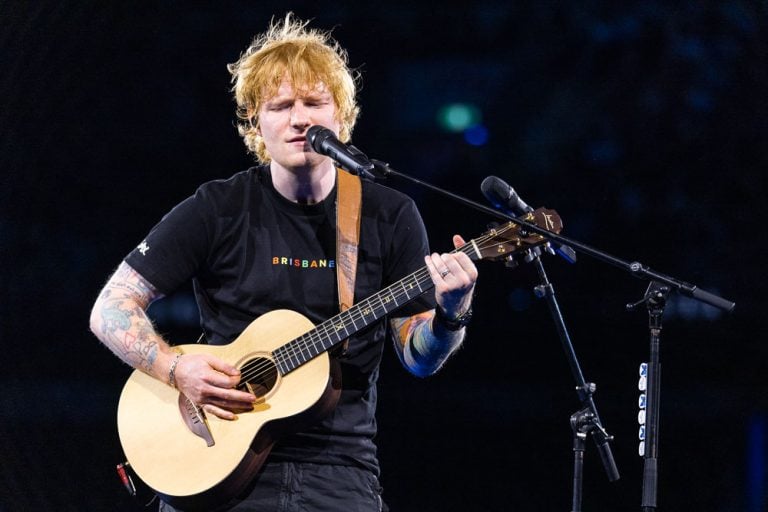“Ed Sheeran may quit music if he loses copyright trial,” several news outlets reported this week.
Don’t threaten me with a good time. In my household, Sheeran’s music has been far from a favourite over the years; to my mind, “Galway Girl” is one of the worst atrocities to involve Ireland since The Troubles.
But Sheeran quitting music under these circumstances would be an unequivocal disaster. For the past week, the Englishman has been locked in a troubling court battle over his song “Thinking Out Loud”, a song that allegedly rips off Marvin Gaye’s utter classic “Let’s Get It On”.
In a Manhattan court, Sheeran has battled musicologists, played a few tunes on his guitar, and generally been on the edge of emotional oblivion (how is it fair to have a jury comprised of people with no inherent knowledge of music theory? How does their propensity for one artist – consider just how maligned Sheeran is – not influence their decision?) The co-writers of “Let’s Get It On” – Gaye and Ed Townsend – have been dead for many decades, and how surreal it must feel to have to defend yourself against the usage of a song created by two people no longer here (not to think of what Gaye and Townsend themselves would have said about all of this).
But listen to “Thinking Out Loud” and “Let’s Get It On” back-to-back: there are similarities. It’s undeniable. In his excellent breakdown (watch below), Rick Beato points out that while the musical concepts may be strikingly similar, the lyrics, melody and verse all differ. But for the uninitiated among us, those lacking musical knowledge, they probably don’t sound similar at all. They don’t share any lyrics for one thing, or a general atmosphere. Sheeran has even claimed that while creating the song, producers actually referred to it as “the Van Morrison tune”
Ed Sheeran is in a copyright lawsuit: did his song “Thinking Out Loud” rip off Marvin Gaye’s “Let’s Get It On”?
Love Music?
Get your daily dose of metal, rock, indie, pop, and everything else in between.
Rick Beato has a great breakdown showing the musical concepts are similar. But lyrics, melody and verse are different (the claim depends on which part is prioritized). pic.twitter.com/czuCwJFkBV
— Trung Phan (@TrungTPhan) May 1, 2023
For there’s a reason lots of other musicians – as Sheeran alluded to in court himself – are backing the singer-songwriter in this trial. If Sheeran loses, it will set an astonishingly worrisome precedent for copyright law in art; it really is the slipperiest of slopes.
There really is no such thing as original art anyway, particularly in the digital age. Too much has gone before us, and we now have access to too much art at the press of a button. By broadening their listening horizons, which has become much easier to do, musicians have opened themselves up to improving their sound, varying it creatively, expanding its sonic potential.
The entire history of music is also the history of remixing and reworking what came before. At number four on the ARIA Singles Chart this week is PinkPantheress’ “Boy’s a Liar”, which very explicitly borrows from classic UK garage; eight places down is Harry Styles’ “As It Was”, a relentlessly groovy number that sounds like it travelled here from the ’80s synth pop world.
If we concede that true originality doesn’t exist, litigating who invented what in music is patently absurd. Granting ownership over basic structural parts of music such as chord progressions would be utterly diminishing, and musical expression would be inhibited as a result.

Hovering over all this, of course, is the racial optics of a famous white artist profiting from black artists, which has happened unopposed for decades, from Elvis to The Beatles to, um, Robin Thicke.
And money is also an insidious factor: if Sheeran were to lose, it would open things up for downright abuse of the system. Just picture salivating music company executives, scouring their vast catalogue of bought songs, gleefully deciding which ones sound slightly similar to another song they’ve heard so that they can chase a quick buck.
If musicians were paid more fairly, more evenly, then maybe this copyright trial wouldn’t feel so momentous. There wouldn’t be the lurking fear that estates and executives would cry “copyright!” over every little song, because the artists they represent wouldn’t be struggling. We should live in a world where those who make art reap the rewards and don’t have to feel anxious about surviving as an artist.
If copyright law is hugely affected following Sheeran’s trial, it begs the question: is all of this in search of greater integrity, or just the pursuit of more profit? I’d struggle through “Galway Girl” one thousand times to ensure that he wins.


































